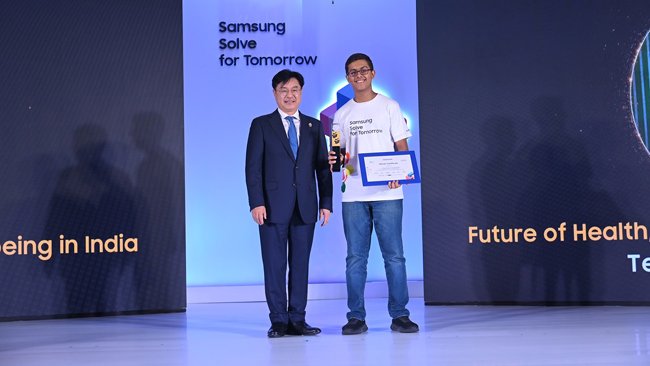
Jaipur, November 20, 2025
In
a nation obsessed with ranks, cut-offs, and entrance examinations, where
adolescence often feels like a relentless race toward the hallowed portals of
the IITs, there occasionally emerges a young mind that dares to defy
convention. Sixteen-year-old Pranet Khetan, a Class 11 student from Shiv Nadar
School, Gurugram, is one such exception, a boy who chose not to compete for
marks, but to communicate for humanity. Pranet was among four winners of
Samsung Solve for Tomorrow 2025, where he developed Paraspeak, a simple device
that records the user’s voice, sends it to a cloud-based AI model, and plays
back a translated version in clear, fluent words even in Hindi.
Samsung
Solve for Tomorrow is the company’s flagship education programme that
challenges young minds to identify real-world problems and develop solutions
using technology. This year the pan-India tech contest had four themes–AI for a
Safer, Smarter, and Inclusive Bharat; Future of Health, Hygiene, and Well-being
in India; Environmental Sustainability via Technology; and Social Change
through Sport and Tech. The four winning teams received a grant of ₹1 crore
incubation support at IIT Delhi.
Pranet’s
immediate goal is to scale Paraspeak, refine its accuracy, and collaborate with
assistive-tech firms to bring it to hospitals and homes across India. He also
hopes to expand its linguistic reach, developing similar databases for other
Indian languages that remain invisible to most global AI systems.
“The
idea began with a simple question,” Pranet recalls. “Why is there no device
that can understand impaired speech, especially when someone is struggling to
articulate it?” That question, asked by a 16-year-old in the quiet hum of his
school’s IT lab, would eventually lead to an invention that won him a place
among the national winners of Samsung Solve for Tomorrow 2025.
The
idea for Paraspeak took root in May 2024, when Pranet visited a paralysis care
centre near New Delhi. There, he met patients who struggled to make themselves
understood, stroke survivors, individuals with cerebral palsy, and those living
with Parkinson’s disease. Over the next year, he immersed himself in the world
of automatic speech recognition (ASR) systems. When he discovered that no major
database existed for dysarthric Hindi speech, the kind produced by neurological
disorders, he decided to build one himself.
“This
became my custom dataset,” he explains. “I trained the AI model to interpret
slurred Hindi speech in real time and reconstruct it into intelligible words.
The first time I heard it work, it felt as though a voice had been given back
to someone who had lost it.”
At
an age when most of his peers are buried under the weight of coaching books,
Pranet is building bridges, not metaphorical ones, but literal pathways of sound
that connect the silenced with the world around them. His innovation,
Paraspeak, is a matchbox-sized IoT-enabled device powered by artificial
intelligence (AI) and machine learning (ML), designed to help patients with
speech and voice disorders that emerge from conditions like stroke, paralysis,
cerebral palsy, Parkinson’s disease, traumatic brain injury, or simply
age-related changes. patients with speech and voice disorders that emerge
from conditions like stroke, paralysis, cerebral palsy, Parkinson’s disease,
traumatic brain injury, or simply age-related changes.
Armed
with little more than a recorder, Pranet visited hospitals and rehabilitation
centres, speaking to over twenty-eight patients and collecting hours of voice
samples. Each recording, he says, was a lesson not only in data but in dignity.